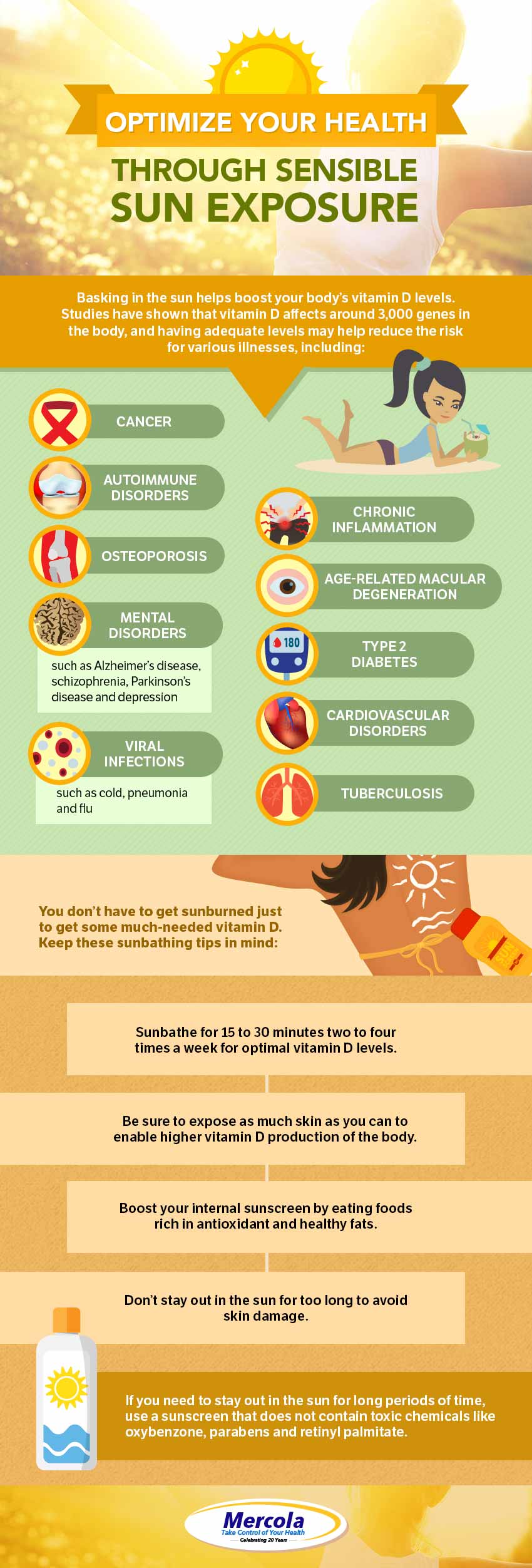Story at-a-glance -
- Increasing your levels of vitamin D through sun exposure may provide many health benefits and help prevent various illnesses.
- Keep in mind that avoiding sunburn is just as important as going in the sun regularly, so make sure that you practice healthy sunbathing habits
While conventional media and medicine promote sun avoidance by using sunscreens that contain potentially harmful ingredients, try a sunscreen that contains ingredients straight from nature. It’s better for your skin and the environment.

The sun has been regarded as nature’s most harmful element, since it’s said to cause severe skin damage that may lead to premature aging and skin cancer. But the said effects of sun exposure have actually been gravely exaggerated and used as a scare tactic by those who are in the business of selling sun protection products, which is why a lot of people nowadays have become afraid of sun exposure.
Unfortunately, most of these chemical sunscreens contain a number of potentially toxic ingredients that may harm your health and the environment. Considering the risk of using chemical sunscreens, not to mention the diseases that you may develop due to lack of sun exposure, it seems that staying out of the sun is actually more harmful than you might expect.
Check Out the Health Benefits That You Can Get by Simply Getting Some Sunlight
Contrary to the erroneous belief spread by conventional doctors, the media and beauty experts, sensible sun exposure is actually good for your overall health since it’s your body’s main source of vitamin D, which is an essential steroid hormone that your body only produces upon exposure to sunlight. Scientific evidence suggests that increasing your levels of vitamin D through sun exposure may provide the following benefits:
|
Stronger immune system
Vitamin D deficiency is associated with an increased risk for autoimmune diseases, so increasing your levels of it may help modulate the innate and adaptive immune responses of the body.1
|
Improved mood and mental health
Vitamin D deficiency is strongly linked to poor mental health and brain disorders, including Alzheimer’s disease, schizophrenia, Parkinson’s disease and depression.
Optimizing your vitamin D levels by going under the sun may help prevent these mental disorders, since vitamin D plays a vital role in neurotransmission.
Moreover, sunlight is found to boost the amount of feel-good brain chemical known as serotonin.
|
|
Reduced inflammation
By reinforcing the immune system, vitamin D can help fight chronic inflammation and the diseases that are related to it, such as chronic inflammatory rheumatic disease (CIRD). |
Lower risk of cancer
Studies suggest that adequate vitamin D levels may reduce your risk of developing cancer by up to 60 percent. Some of the cancers that it may help prevent include lung, prostate, pancreatic, ovarian and skin cancers.
|
|
Reduced risk of cardiovascular diseases
Studies show that vitamin D may help lower the risk of developing hypertension, atherosclerotic heart disease, heart attack and stroke.
|
Increased fertility
Vitamin D may help address infertility in both men and women by increasing the production of testosterone or progesterone. It also promotes regular menstrual frequency in women who are diagnosed with polycystic ovarian syndrome (PCOS).
|
|
Lower risk of diabetes
Research suggests that vitamin D may have an effect on glucose metabolism, and a deficiency of it may lead to Type 2 diabetes.
Another study found that increasing vitamin D levels helps prevent pre-diabetes from progressing into worse forms of this disease. It may also counteract drug-induced hyperglycemia.
|
|
Tips to Optimize Vitamin D Levels Without Damaging Your Skin
Sensible sun exposure is the key to optimizing your vitamin D levels safely and effectively. Keep in mind that avoiding sunburn is just as important as going in the sun regularly, so make sure that you practice healthy sunbathing habits.
It’s usually recommended for healthy people to get 15 to 30 minutes of unprotected sun exposure two to four times a week. If you’re not used to being in the sun, you should build up your tolerance by sunbathing early in the spring before gradually prolonging the time of your sun exposure. You should also consider your skin color, as darker skin tends to produce less vitamin D. Therefore, longer sun exposure is needed.
The ideal time to get your dose of sunlight is around solar noon or during mid-day. Make sure that you expose as much skin as you can. You should also boost your body’s internal sunscreen by consuming foods that are rich in antioxidants and healthy fats, such as sprouts, blueberries, blackberries and wild-caught Alaskan salmon.
If you really need to use a sunscreen because you’re staying under the sun for prolonged periods of time, such as when you’re exercising or doing outdoor activities, choose a product that can protect you against UVA and UVB rays. You should also steer clear of sunscreens that contain harmful chemicals like oxybenzone, retinyl palmitate and fragrance. It’s best to use a safe sunscreen with astaxanthin, a potent antioxidant from marine algae that may help prevent sun damage.
Click Here to Learn More About Vitamin D